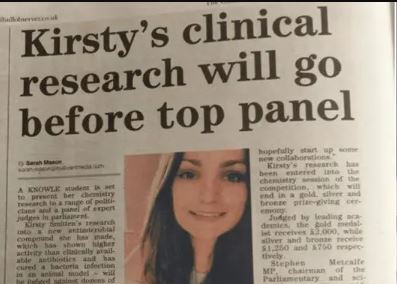Kirsty Smitten, who created two breakthrough antibiotic compounds, has only a few months to live. Following a rare medical diagnosis, a scientist who had hopes of receiving the Nobel Prize for her research has only a few months left to live. This comes after the work of Kirsty Smitten may prevent a medical catastrophe and save countless lives.
Also Read: Does Hugh Jackman have cancer? Actor undergoes two biopsies, results awaited
Who is Kirsty Smitten?
Kirsty Smitten is a 28-year-old world-leading scientist who could save hundreds of millions of people with her breakthrough antibiotic drug, which previous scientists had failed to develop for nearly four decades. Following a diagnosis of a deadly form of heart cancer, which affects just two people in the UK each year, Smitten received the news that she had months to live.
“How? I mean, really, how has this happened?” asked Kirsty to an interviewer at the Cornish bolthole, where she is spending a week recuperating between rounds of chemotherapy with her fox-red labrador, Bailey.
Also Read: Who was Ryuichi Sakamoto? Japanese composer dies at 71 after battling cancer
“I eat healthily. I don’t drink much, I don’t smoke. And, until my diagnosis, I played sports every day. There aren’t words to express how sad I feel that I might not be around to see how our potentially Nobel Prize-winning work might unfold. My only hope is that the work carries on without me. I’m sure it will.”
It is estimated that by 2050, the number of deaths attributable to drug-resistant bacteria, such as MRSA, may increase to ten million. Kirsty has created two antibiotic compounds with her team at Metallo Bio, a company she founded with the help of her doctoral advisor at Sheffield University, to combat bacterial diseases like meningitis and pneumonia.
Also Read: Who is Anna ‘Chickadee’ Cardwell? Mama June Shannon’s daughter diagnosed with stage 4 cancer
She is taking the initiative to combat anti-microbial resistance, which the World Health Organization considers to be one of the largest risks to global health. According to the organization, bacteria, viruses, fungi, and parasites have evolved through time and are no longer manageable with the existing medications.
Kirsty added by saying, “New things are coming out, and we just need to keep buying me time. But there’s still a 68 percent chance I’ll die within 12 months of diagnosis.”







